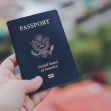The U.S. State Department took a step toward accomplishing its gender inclusivity policy push by issuing the first-ever U.S. Passport with an “X” gender marker. While this is a momentous occasion for the LGBTQI+ community, the service won’t be routinely offered until early 2022.
The move began as a campaign promise for the 2020 Presidential Election by the Biden-Harris team. Biden promised to build on the Obama Administration’s progressive change to gender policies for U.S. passports and stated the campaign “believes every transgender or non-binary person should have the option of changing their gender marker to ‘M,’ ‘F,’ or ‘X’ on government identification, passports, and other documentation.”
The International Civil Aviation Organization (ICAO) issued the first standardization guidelines for passports in 1980. The organization is not an international regulator but provides guidance and recommendations through research and panel votes. The ICAO created a standard for machine-readable passports, biometric passports, and the use of RFID computer chips. They aim to make crossing the border more efficient and safer by creating minimum standards for countries to abide by when designing their travel documents.
The most recent review by ICAO on gender markings in travel documents was issued in December of 2012 after the 21st meeting of the Technical Advisory Group on Machine Readable Travel Documents (TAG/MRTD). New Zealand presented a paper to the group requesting clarification on whether gender was still required biodata in the age of the new e-travel documents, the improvement of facial recognition technology, and other identification methods.
TAG/MRTD commented that the change “would impose significant costs on border authorities” and that “removing the requirement to display a holder’s gender on travel documents would complicate the operations of border authorities.” At the time of the meeting, the Group determined that the costs far outweigh the benefits and recommended to New Zealand to continue displaying the holder’s gender on government-issued travel documents.
However, New Zealand did not take the recommendation of TAG/MRTD, and that same month allowed for an “X” as a third gender option on their passports. Currently, New Zealand allows individuals to choose their preferred gender without changing the details on their birth or citizenship records. Other countries that allow a third gender option include Argentina, Canada, and Colombia.
In the UK, Christie Elan-Cane lost the battle to bring a gender-neutral option to British passports in March of 2020. The senior judges found that it was not unlawful to mandate either Male or Female demarcation in the country’s passport. The law firm representing Christie Elan-Cane disagreed with the ruling and pointed to the European Convention on Human Rights which “guarantees a right to respect for non-gendered identity.”
Critics of the third gender marker option say that it could create more harassment for individuals when traveling abroad, especially in countries that are not LGBTQ+ friendly. However, supporters argue that in fact, harassment and embarrassment will decrease as individuals will not have to present a document that does not adequately represent who they are.
Earlier this year the State Department eased its rules on selecting a preferred sex on the U.S. passport by disbanding the previous policy of requiring a medical doctor to certify that a gender transition was complete. Now, individuals can self-certify their sex on their U.S. passport without this medical certification and beginning in 2022 can choose to not be identified by gender at all.






